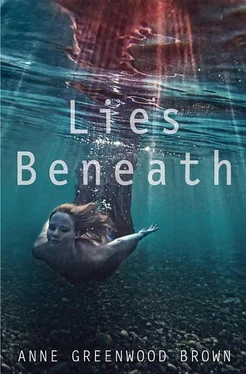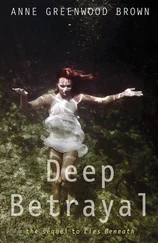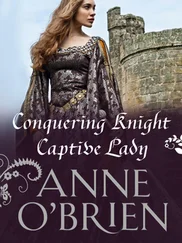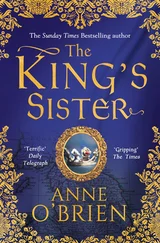Outside my window, shrouded sailboats stood in dry dock. I stared at the name on one of the uncovered sterns. Kismet . Was that the one? Since falling out of my parents’ sailboat as a toddler, I’d struggled to remember the name of the vessel. Not knowing how to read at the time made it harder to remember now. My only memory was a vague shape of letters. Maybe a K ? Or an R ? Unlike me, my sisters had been born to this life. I envied their easy minds, never fighting against nature, never wondering what if .
When the sky finally darkened, Maris gave a short nod and we all scrambled out of the car. It was late on a school night, and the park was finally deserted. Still, I couldn’t help but look behind me to make sure we were alone. The girls didn’t bother. They were stripping down and shoving their street clothes and cell phones under the seat of the car. Maris grabbed the canvas bag and slung it across her bare chest.
“You’ll adjust, Cal,” Tallulah said, the bitter remnants of our last text messages lingering in her tone. “You always do.”
Pavati winked. “Just swim fast. You’ll warm up.”
We were all naked now. The wind raised goose bumps on my arms. “Try and catch me,” I said. I ran across the grass to the fishing pier, jumped onto the railing, and dove, my sisters a half second behind.
As my hands pierced the surface, the icy temperature sliced through my skin, upward and outward, like a thousand razors. My heart constricted, and my mouth contorted with pain. White blossoms of clean bright light bloomed in my field of vision. Water filled my ears with a tinny ringing. The freezing water rushed into my lungs, and I took my first deep breath in what felt like days, luxuriating in the fullness of it. Despite the night sky, underneath the surface, light still bounced and played between my fingers and around my arms. I barely noticed as my body temperature dropped to match the water’s.
Surrendering to the inevitable, I relaxed my muscles and dolphin-kicked my legs as one unit, propelling myself with a fluid thrust, reveling in the liquefying feeling that hummed and pulsed as the ripple of change washed through my body. My thighs tingled, then burned, as the metamorphosis took over—first knitting my bones, then breaking through the skin with scales and fin.
As usual, Pavati changed quickest and burst forward with admirable speed. Her cobalt-blue tail flashed by my face. “Showoff!” I teased, and heard a trickle of a laugh in response.
Tallulah swam beside me, waiting for me to finish the change. A metallic silver ring appeared around her throat, as I knew it eventually would around mine. Her lower half was already covered in rows of scales, like silver sequins.
Maris tore by without a backward glance; her sleek onyx-colored tail nothing more than a shadow. The girls always changed quicker than I did. They were born to this life, plus they never went as far south as I did. Their bodies didn’t take as long to acclimate.
My body heaved and— Ah —with one big whip of my legs, my tail was fully embodied. I relished the freedom—as close to happy as I ever was—and shot through the deepening water like a torpedo.
Tallulah and I coasted along the sandy bottom and searched ahead for any danger. It was still too early for there to be much vegetation, so we stayed clear of the ferry’s path. It would only take one person peering over the rail to start a scandal. Usually that meant more trouble for the witness than for us. The general public tended to frown on mermaid reports. But we didn’t need Hancock to hear that kind of noise—particularly on the off chance he’d heard his father’s story and believed it was true.
As I cut through the dark water, constellations of tiny particles streamed by me. My ears welcomed the familiar squeaks of lake trout and the low vibration of far-off ore boats. I shot over sunken timbers and chased a sturgeon. Its rough skin reminded me of the sand sharks I’d played with only the day before. I dragged my fingers across its flat head and down the row of spiny bumps on its back. It was young, only half my size.
Tallulah grabbed my arm and tugged me in a different direction. I looked away from the fish and saw why: a row of nets along the shore. I whipped my tail, stirring the sand and scaring the sturgeon, and tore off perpendicularly to my original path. Tallulah never left my side.
We followed Madeline Island’s far shoreline and rounded its northern tip. Tallulah looked at me playfully, challenging me to a race. We circled Madeline twice before she tore off in the direction of our usual campsite on Basswood Island. I would have liked to swim another hour— hell , as parched as my body had been, I could have swum all night—but I followed in the plowed path of Tallulah’s wake, because if we were launching Operation Hancock tomorrow, I was going to need my sleep.
Within a few minutes Basswood’s familiar rocky ground came up to meet us, welcoming us home. When it became too shallow to swim, we searched for a break in the rocks and a sandy spot to make the change. For the first time, Tallulah moved away from me, giving us both the room we needed. Forcing our bodies back into human shapes sucked big-time. As kids, we rarely left the water; the transformation usually left us puking in the sand. These days, the worst I got was the dry heaves.
When the bones began to split, I arched my back and braced against the pain. Twisting in the sand, I bit down on my lip until I tasted blood, then gasped with ragged breaths that burned my lungs. A minute later the last of the tremors rippled past my toes as I sputtered and coughed at the dry air.
Tallulah looked down as she walked past me. She winked at my vulnerability, the inevitable result of being naked and unable to run. I rolled my eyes to watch the water run off her in little rivers that trickled down her arms and dripped off her middle fingers. The backs of her bare legs were red from the recent trauma.
After another minute my breathing fell into a rhythm, and I clawed my way onto dry sand, finding my legs and pushing myself to standing. My sisters sat on the beach, wearing the yellowed cotton rags they’d pulled from Maris’s canvas bag. The silver rings were already fading around their throats. Pavati tossed me a pair of tattered shorts as she fed driftwood into a small campfire. Maris had my sturgeon friend skewered on a spit.
The next morning, I woke before the girls. For a few minutes I lay quiet and unmoving in the sand, my back pressed up against a boulder, my skin cool in the shadow of the oak trees, my brain trying to remember where I was. The previous day’s conversations trickled back into my consciousness. Maris turned over sleepily and mumbled something unintelligible. I got up, and she rolled into the empty spot I left in the sand. She murmured again, “He was supposed to come home.”
I kicked at the sand, dusting her legs. “I did come home. Get off it, Maris.” She groaned in response and curled into a ball.
The sun was just rising, and it cast pink beams of light on the spires and gingerbread details of Bayfield’s oldest buildings. I set my teeth in preparation for the job ahead of me. I knew what I needed to do. But as eager as I was to earn my freedom from Maris and the family, my first priority was going to have to be food—and lots of it. Even at this distance I could smell yeast and bacon grease wafting through the air from Bayfield’s breakfast joints.
I tossed my shorts in the bushes and wrote a note for my sisters in the sand: On it .
Three long strides and I splashed into the lake, diving into the sunlit path when I could no longer stand. I counted out the seconds in my head as the transformation took place. It was quicker than the night before but crap, I had a lot of work to do on my timing.
Читать дальше












